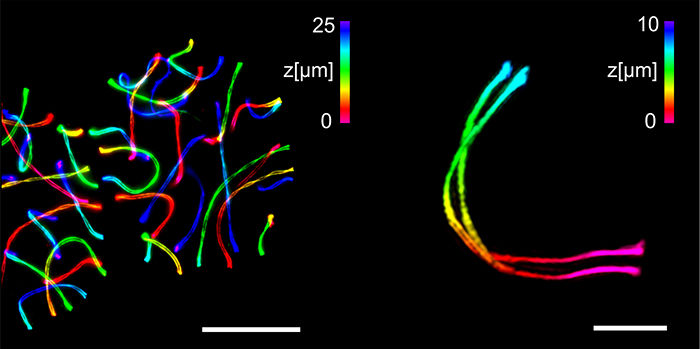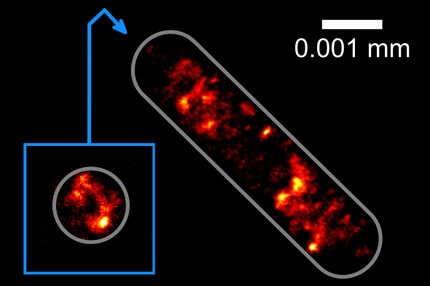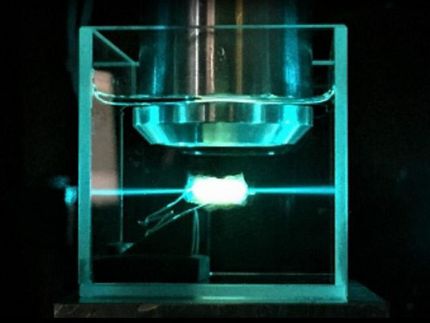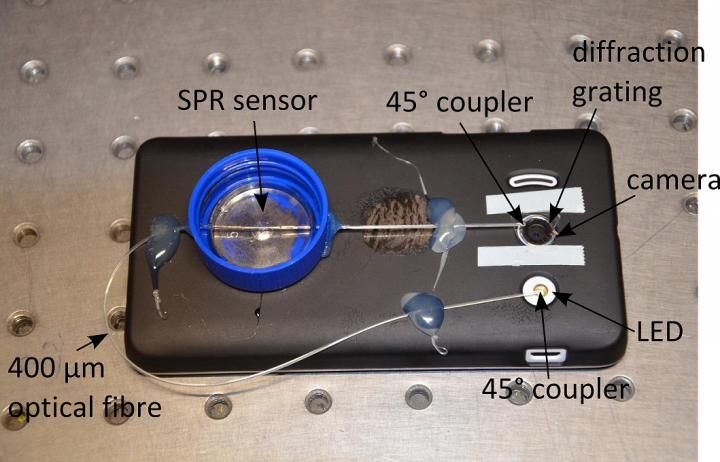High-end Microscopy Refined
New details are known about an important cell structure
For the first time, two Würzburg research groups have been able to map the synaptonemal complex three-dimensionally with a resolution of 20 to 30 nanometres.

Left two sperm-forming cells expanded with ExM-SIM and imaged with a diffraction limited microscope. On the right, a detailed 3D image of a single synaptonemal complex. The 3D information is colour-coded, the measuring bar on the left corresponds to 25 micrometres, the bar on the right to three micrometres.
Working groups Benavente und Sauer / Universität Würzburg
The synaptonemal complex is a ladder-like cell structure that plays a major role in the development of egg and sperm cells in humans and other mammals. "The structure of this complex has hardly been changed in evolution, but its protein components vary greatly from organism to organism," says Professor Ricardo Benavente, cell and developmental biologist at the Biocenter of Julius-Maximilians-Universität (JMU) Würzburg in Bavaria, Germany.
This points to the fact that the structure is crucial for the undisturbed function of the complex. Benavente is investigating the synaptonemal complex together with Markus Sauer, Professor of Biotechnology and Biophysics at the JMU Biocenter.
The data indicate, among other things, that the synaptonemal complex in the case of the mouse is not, as previously assumed, double-layered, but far more complex.
Sophisticated combination of microscopy techniques
"In our study, we combined structured illumination microscopy SIM with various methods of expansion microscopy ExM," explains Sauer, who is an expert in high-resolution microscopy. The ExM enables greater resolution by embedding the target structures into a swellable polymer which can be physically ~ 4fold expanded.
ExM in combination with SIM enabled the researchers for the first time to visualize the three-dimensional ultrastructure of the synaptonemal complex by multicolour imaging with a spatial resolution of 20 to 30 nanometres.
"If immunolabeling is performed after expansion of the complex, the antibody accessibility can be improved compared to other high-resolution methods. This has enabled us to decipher details of the molecular organisation that were previously hidden," said Benavente and Sauer. In addition, the images can now be taken with almost molecular resolution on a standard light microscope.
With the combination of ExM-SIM, the JMU teams are now looking to discover further details of the synaptonemal complex and other multi-protein complexes.
Original publication
Other news from the department science

Get the life science industry in your inbox
By submitting this form you agree that LUMITOS AG will send you the newsletter(s) selected above by email. Your data will not be passed on to third parties. Your data will be stored and processed in accordance with our data protection regulations. LUMITOS may contact you by email for the purpose of advertising or market and opinion surveys. You can revoke your consent at any time without giving reasons to LUMITOS AG, Ernst-Augustin-Str. 2, 12489 Berlin, Germany or by e-mail at revoke@lumitos.com with effect for the future. In addition, each email contains a link to unsubscribe from the corresponding newsletter.




















































